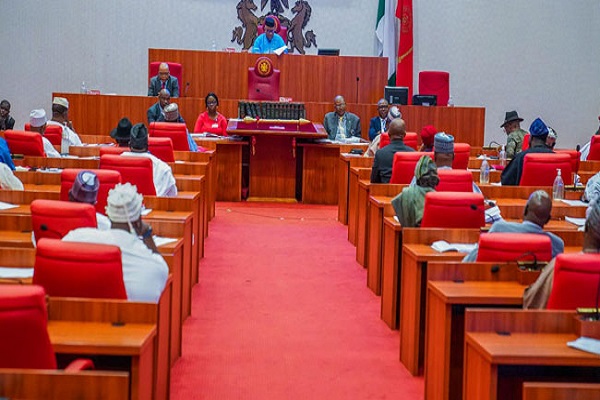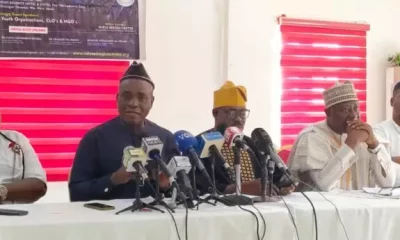News
Subsidy Removal: NASU bemoans absence of palliatives

The Non-Academic Staff Union of Educational and Associated Institutions (NASU) has bemoaned absence of palliatives more than two months after the removal petrol subsidy.
Mr Michael Adebola, Chairman, NASU FCT Council said this at the Quadrennial Conference/Election of the council on Monday in Abuja.
Adebola noted that the unending upward adjustment in the pump prices of petrol which have moved from the initial N540 to over N617 per litre.
According to him, we are not oblivious to the cries of our members in the FCT council on the high cost of transportation with a resultant effect on the cost of living.
“We demand that the government should work on policies that can alleviate the suffering of the masses through well-packaged palliatives.
“Also, they have to improved the salary structure, and our refineries should be refurbished and be put under good use,” he said.
On the Integrated Personnel Payroll Information System (IPPIS) as a salary payment system, he noted that the platform was ineffective.
Adebola said that the payment platform has brought inconsistency and tears to workers and unions in tertiary institutions.
“The IPPIS which would have been a good system for union dues remittance is ineffective and full of fraudulent activities. There are lots of irregularities and short payments of union dues.
“A lot of branches in the FCT council are facing pending and unresolved issues with the IPPIS despite all the efforts to ensure corrections.
“We, therefore, appeal to the government to scrap IPPIS and replace it with a better system of unified payment.
“A lot of our members’ dues deductions are going to other unions’ accounts due to the mistakes of IPPIS,”he said. In his remarks,
Mr Hassan Makolo, National President of NASU commended the giant stride the out-gone exco recorded, cautioned state governments against reducing the number of work days.
Makolo said that the International Labour Organisation (ILO) had prescribed five work days in a week and eight hours per day of work.
“It says any practice that is contrary to the specifications of the ILO is likely going to affect national productivity adversely.
“All we know is that workers are expected to work for five days a week and eight hours per day.
“That ought to be maintained. Now if we reduce the number of workdays, that is going to affect productivity negatively,” he said.
NASU president however faulted the issue of working from home.
He added that, there is no infrastructure to make that happen now, especially with low broadband penetration and epileptic power supply.
He also cautioned labour unions against accepting a reduction of days of work in a week, saying accepting the practice could lead to job loss soon.
“If the number of work days is reduced, it means that government could reduce the workforce by half.
“This is because if tasks that are executed in five days can be done in three days, it will mean that half of the workforce can do the job.
“So, the workers could become endangered species, ‘he said.
He urged the Federal Government to introduce palliatives that will ensure cheaper means of transportation to and from work rather than contemplate a reduction in the number of work days.
He added that what they expect is for government to provide palliatives that will make meaning to the people.
According to him, why can’t the government get buses that can take workers to their workplaces free of any charges to and back?
“So, the manpower that will be lost staying at home can translate that into productivity,”he add. On additional N10,000 to workers’ salaries which some state governments have begun to implement, Makolo said it was wrong.
“What does N10,000 do to help workers in the present circumstances? I do not like discussing states because the majority of the state governments are not even implementing N30,000 minimum wage as a national law.
“Some of them pay in per cent and not that they will offset the balance at a later date. They are owing the workers in perpetuity,”he added.
Also, Prof. Hussaini Ibrahim Director General of the Raw Materials Research and Development Council (RMRDC), urged labour leaders to stand on the cusp of a remarkable juncture.
He said that is where collaboration and dialogue hold the potential to shape the positive trajectory of industrial relations. Ibrahim said that RMRDC was collaborating with labour unions to execute the regular promotion of staff, welfare packages, local and international training for staff of all cadres among others.
At the end of the delegates’ conference, Hassan Gorroh was elected FCT council while Bola Ajayi was returned secretary.
Others include Zakari Tso, who was elected treasurer and Bosun Olajubu that emerged as an executive member of the FCT council.
Headline
Prince Harry visits sick Nigerian soldiers in Kaduna

Prince Harry and his team visited the 44 Nigerian Army Reference Hospital in Kaduna to interact with wounded soldiers who are receiving treatment.
The Duke of Sussex is in Nigeria with his wife to champion the Invictus Games, which Harry founded to aid the rehabilitation of wounded and sick servicemembers and veterans.
Nigeria joined the Invictus Community of Nations in 2022 becoming the first African country to join.
Prince Harry’s visit to Kaduna came 68 years after his late grandmother Queen Elizabeth II visited the state during the time of the late Premier of Northern Region Sir Ahmadu Bello.




News
Senate approves death penalty for drug traffickers

Senate on Thursday, May 9, approved the death penalty for those convicted on the charge of drug trafficking in the country.
The punishment prescribed in the extant NDLEA Act is a maximum sentence of life imprisonment.
The resolution of the Senate followed its consideration of a report of the Committees on Judiciary, Human Rights and Legal Matters and Drugs and Narcotics, National Drug Law Enforcement Agency (NDLEA) Act (Amendment) Bill, 2024.
The Chairman of the Committee on Judiciary, Human Rights & Legal Matters presented the report during plenary, Senator Mohammed Monguno (APC-Borno North).
The bill, which passed its third reading, aims to update the list of dangerous drugs, strengthen the operations of the NDLEA, review penalties, and empower the establishment of laboratories.
Section 11 of the current act prescribes that “any person who, without lawful authority; imports, manufactures, produces, processes, plants or grows the drugs popularly known as cocaine, LSD, heroin or any other similar drugs shall be guilty of an offence and liable on conviction to be sentenced to imprisonment for life” was amended to reflect a stiffer penalty of death.
Although the report did not recommend a death penalty for the offence, during consideration, Senator Ali Ndume moved that the life sentence should be upgraded to the death penalty.
During a clause-by-clause consideration of the Bill, Deputy Senate President Barau Jibrin, who presided over the session, put the amendment on the death penalty to a voice vote and ruled that the “ayes” had it.
But Senator Adams Oshiomhole objected to the ruling, saying that the “nays” had it.
He argued that matters of life and death should not be treated hurriedly, but Barau said it was too late, as he failed to call for division immediately after his ruling.
The bill was subsequently read for the third time and passed by the Senate.
-

 Headline6 days ago
Headline6 days agoSuspend cybersecurity levy– Reps to CBN
-

 Business6 days ago
Business6 days agoNigeria needs over $2bn to revive Ajaokuta Steel Plant, says Minister
-

 Headline4 days ago
Headline4 days agoPrince Harry visits sick Nigerian soldiers in Kaduna
-

 Entertainment4 days ago
Entertainment4 days agoAMVCA Cultural Day: BBNaija’s Neo, Venita win Best Dressed Male, Female
-

 Metro4 days ago
Metro4 days agoEx-Sports Minister laments after hospital neglected him for hours over N80000 deposit
-

 Headline6 days ago
Headline6 days agoTinubu resumes work after foreign trip
-

 News6 days ago
News6 days agoShan George’s money returned to Zenith Bank account













